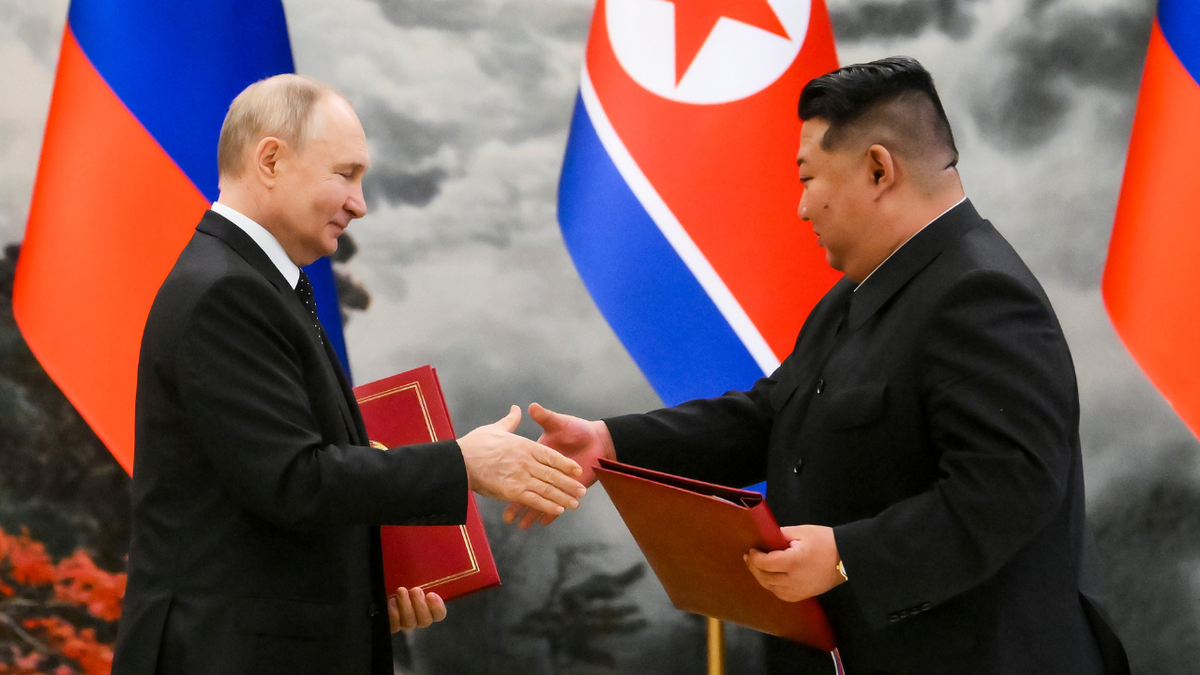- China has refrained from taking a stance on a new defense agreement between Russia and North Korea, which experts say could disrupt regional power dynamics.
- Chinese leaders are concerned about a potential loss of influence over North Korea and instability on the Korean Peninsula.
- The US has expressed concerns about the deal, saying it would violate United Nations Security Council resolutions and undermine global stability.
With no clear alternative, China appears to be keeping its distance, while Russia and North Korea are moving closer to each other through a new defense agreement that could affect the balance of power among the three authoritarian states.
Experts say China’s leaders are concerned about a potential loss of influence over North Korea after its leader Kim Jong Un and Russian President Vladimir Putin signed the deal this week, and that it could increase instability on the Korean Peninsula. But Beijing is also struggling to respond because of its conflicting goals: keeping the peace in Korea and countering the US and its Western allies on the global stage.
Beijing has so far not commented on the agreement – which sees the two countries provide defence assistance if one is attacked – and has only reiterated that it wants to maintain peace and stability on the Korean Peninsula and a political solution to the North-South division.
Victor Cha, senior vice president for Asia and Korea at the Center for Strategic and International Studies, said China’s response has been “very weak.” He said this could be a sign that Beijing doesn’t yet know what to do.

Russian President Vladimir Putin (left) and North Korean leader Kim Jong Un exchange documents during the signing ceremony of the new partnership in Pyongyang, North Korea, June 19, 2024. (Kristina Kormilitsyna, Sputnik, Kremlin Pool Photo via AP)
“Every option is a bad option,” he said. “Either you are unable to decide because of very strong competing considerations or … you are unable to decide because you don’t know how to evaluate the situation.”
Some in Beijing may welcome the Russia-North Korea partnership as a way to push back against U.S. dominance in world affairs, but Cha said there is also “a lot of uneasiness” in China, which doesn’t want to lose influence over its neighbor to Russia, doesn’t want to see a destabilizing nuclear power on its doorstep, and doesn’t want to bring conflict in Europe to Asia.
But China is not raising these concerns publicly. “They do not want to push Kim Jong Un further into Vladimir Putin’s arms,” Cha said, referring to the leaders of both countries.
Biden leading China, Russia into ‘shocking’ partnership, expert warns: ‘Biggest blunder’
Chinese Foreign Ministry spokesman Lin Jian declined to comment on the new agreement. “Cooperation between Russia and the DPRK is a matter between two sovereign states. We don’t have information on the relevant matter,” he said, referring to North Korea by the initials of its official name, the Democratic People’s Republic of Korea.
White House national security spokesman John Kirby told reporters that the agreement between Russia and North Korea “should be of concern to any country that believes that United Nations Security Council resolutions should be followed.” The Security Council has imposed sanctions on North Korea to prevent its development of nuclear weapons.
Kirby also said the agreement “should be of concern to anyone who thinks supporting the people of Ukraine is an important thing to do. And we think that concern will be shared by the People’s Republic of China as well.”
Alexander Gabuev, director of the Carnegie Russia Eurasia Center, said one area China may be concerned about is whether Russia would help North Korea’s weapons program by sharing advanced technology.
“If China is really concerned, it has influence in both Russia and North Korea and it could potentially try to put some limits on these relationships,” he said.
This week’s meeting between Putin and Kim is the latest chapter in decades of complex political and military relations in East Asia, where the Chinese Communist Party, once seen as weak, has emerged as a leading power with influence over both North Korea and Russia.
This and other developments have raised concerns in the US that Beijing, now the world’s second-largest economy, could challenge the US-led world order by aligning with countries such as Russia, North Korea and Iran. Beijing has rejected this charge.
Sun Yun, director of the China Program at the Stimson Center, said Beijing does not want to form a trilateral alliance with North Korea and Russia because it “needs to keep its options open.”
He said such an alliance could mean a new Cold War, which Beijing says it wants to avoid, and that being limited to Pyongyang and Moscow would be contrary to China’s goals of maintaining ties with Europe and improving relations with Japan and South Korea.
Sun said improving ties between North Korea and Moscow “opens up a space of uncertainty and possibilities, but based on what has happened so far, I don’t think it has harmed China’s national interests.”
Click here to get the Fox News app
Danny Russel, who was the top U.S. diplomat for Asia in the Obama administration, said a closer relationship between Putin and Kim could weaken Beijing’s influence and cause it “the greatest harm.”
“Apart from irritation at Putin’s intrusion into what most Chinese consider their sphere of influence, the real cost to China is that aligning with Russia gives North Korea greater impunity and room to manoeuvre without regard to Beijing’s interests,” he said.
Russell, now vice president for international security and diplomacy at the Asia Society Policy Institute, said Kim is keen to reduce his country’s dependence on China.
“A reduction in Chinese influence means Kim Jong Un is more likely to ignore Beijing’s calls for restraint,” he said, “and that is more likely to lead to chaos at a time when (Chinese leader) Xi Jinping wants stability.”















